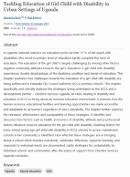| dc.contributor.author | Eron, Lawrence | |
| dc.contributor.author | Emong, Paul | |
| dc.date.accessioned | 2023-02-23T12:59:03Z | |
| dc.date.available | 2023-02-23T12:59:03Z | |
| dc.date.issued | 2017-01-07 | |
| dc.identifier.citation | Eron, L., Emong, P. (2017). Tackling Education of Girl Child with Disability in Urban Settings of Uganda. In: Pink, W., Noblit, G. (eds) Second International Handbook of Urban Education. Springer International Handbooks of Education. Springer, Cham. https://doi.org/10.1007/978-3-319-40317-5_5 | en_US |
| dc.identifier.isbn | 978-3-319-40317-5 | |
| dc.identifier.uri | DOI: 10.1007/978-3-319-40317-5_5 | |
| dc.identifier.uri | https://hdl.handle.net/20.500.12504/1236 | |
| dc.description | 51-65p | en_US |
| dc.description.abstract | In Uganda, national statistics on education point out that, 75 % of the pupils with disabilities who enroll in primary level of education hardly complete this level of education. The education of the girl child is largely challenging by among other factors negative community attitudes towards the girl’s education. A girl child with disability experiences double disadvantage of the disabling condition and denial of education. This chapter examines how challenges towards the education of a girl child with disability are being addressed in Kampala City Council Authority (KCCA) primary schools. This chapter, specifically and critically analyses the strategies being undertaken by the KCCA and a development partner – Cheshire Services Uganda, an NGO dealing in disability and education in KCCA to bring about an inclusive education environment. It presents how the human resource, educational facilities and learning opportunities are made accessible and adaptable to all learners regardless of one’s (dis)ability. The chapter further explores the relevance, effectiveness and sustainability of these strategies. It identifies and discusses how factors such as health, economics of disability, attitude and psychosocial factors influence inclusive education for the girl child with disability. Enabling factors for every school going age girl child with disability in KCCA schools to access mainstream schools in her community is identified. How effective these strategies are in bringing about a school which includes everybody, celebrates difference, supports learning, and responds to individual needs are documented. Lastly strategies for sustainability by individual schools and communities after the expiry of support from Cheshire Services Uganda concludes. | en_US |
| dc.language.iso | en | en_US |
| dc.publisher | Springer International Publishing Switzerland | en_US |
| dc.subject | Uganda | en_US |
| dc.subject | Special education | en_US |
| dc.subject | Girls | en_US |
| dc.title | Tackling education of girl child with disability in urban settings of Uganda | en_US |
| dc.type | Thesis | en_US |

